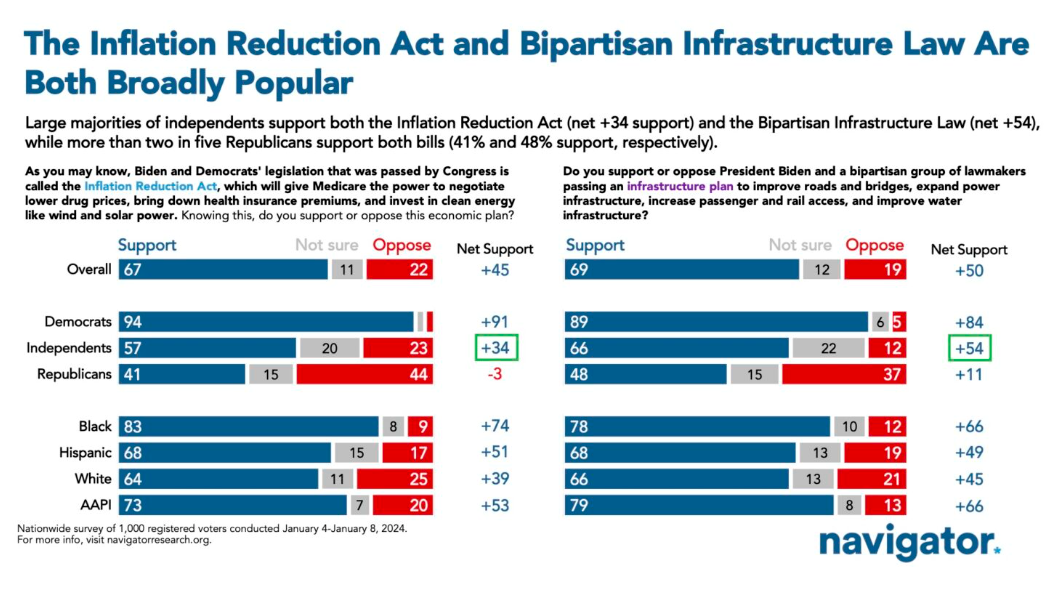Resources
Search below for resources covering the intersection of climate engagement, social science and data analytics.
Latest Resources
Environmental Polling Roundup - January 26th, 2024
This post includes climate and environment headlines, data points, and key takeaways from recent public polls - including a new update of Yale’s Climate Opinion Maps with estimates of climate attitudes down to local geographies, new polling on Americans’ top issue concerns, and new polling on the electricity grid and clean energy transition.
WSP Energy Future Report: Electric Grid Reliability Worries Americans
Americans are widely concerned about aging and unreliable electric grid infrastructure. Grid reliability, along with health and jobs, is a key argument in favor of transitioning to clean energy.
Yale Climate Opinion Maps 2023
New Yale Climate Opinion Maps provide updated estimates of Americans’ climate attitudes down to the state, county, metro area, and congressional district levels. While most polling on climate attitudes is conducted at either the national or state levels, Yale’s Climate Opinion Maps utilize national polling data to estimate public attitudes down to smaller geographies – providing advocates with a unique set of data to hold policymakers at various levels of government accountable.
Environmental Polling Roundup - January 19th, 2024
This post includes climate and environment headlines, data points, and key takeaways from recent public polls - including a new analysis of the impact of voters’ climate attitudes on the 2020 presidential election results, new polling on electric vehicles, new polling on competitiveness with China on clean energy, and a new analysis of climate justice attitudes across Yale and George Mason’s “Six Americas” segments.
On Climate Disinformation
Freezing temperatures and skyrocketing energy costs are knocking on our doors again in Texas, and conversations about reliable renewable energy projects are once again emerging. This has us thinking quite a bit this week about what stands in the way of siting and building renewable projects that are now well funded, thanks to the Inflation Reduction Act. Inevitably we return to the conversation about the role of misinformation.
Support for climate justice across Global Warming’s Six Americas
Support for climate justice and recognition of climate disparities vary widely across global warming’s “Six Americas”. More climate-conscious Americans are both much more likely to recognize existing climate disparities and much more likely to support the goals of climate justice than Americans who are less concerned about global warming. However, even among the segments who are most attuned to the issue of climate change, most are not hearing about “climate justice” as a concept. The Alarmed and Concerned segments (who make up 56% of the U.S.
Climate change opinion and recent presidential elections
Polling on the 2020 presidential election suggests that climate change cost Republicans 3-4 points in the election, as pro-climate independents in particular overwhelmingly supported Biden over Trump. Roughly two-thirds of 2020 voters (67%) rated climate change as a “somewhat” or “very” important issue and that three-quarters of these voters (77%) supported Biden. U.S. adults trust Democrats more than Republicans on climate change, on average. This issue advantage for the Democrats (26 points, in a recent survey) is one of the largest that either party has on any issue.
Investments in Electric Vehicles: A Guide for Advocates
Health and energy independence rank as the most persuasive rationales for investment in electric vehicles; “zero-emissions vehicles” are less polarizing than “electric vehicles”. In a test of several arguments in support of electric vehicle investment, reducing pollution and health problems like asthma stands out as the most convincing reason for electric vehicle investment overall (61% convincing). Majorities also say that reducing our dependence on foreign countries for oil (57% convincing and helping combat climate change (56%) are convincing reasons for electric vehicle investment.
Environmental Polling Roundup - January 12th, 2024
This post includes climate and environment headlines, data points, and key takeaways from recent public polls - including new polling on a new report from Yale and George Mason’s “Climate Change in the American Mind” study and a new meta-analysis of polls tracing political polarization on climate and environmental issues.
Climate Change in the American Mind: Beliefs & Attitudes, Fall 2023
Steady majorities of Americans say that global warming is happening, caused by humans, and affecting the weather. If they could talk to global warming experts, Americans are particularly eager to learn about specific actions that countries like the U.S. can take to address the problem. 72% of Americans recognize that global warming is happening, while just 15% say that it isn’t. Americans are twice as likely to say that global warming is caused mostly by humans (58%) than to say that global warming is caused mostly by natural changes in the environment (29%).
Pagination
- Previous page
- Page 7
- Next page






